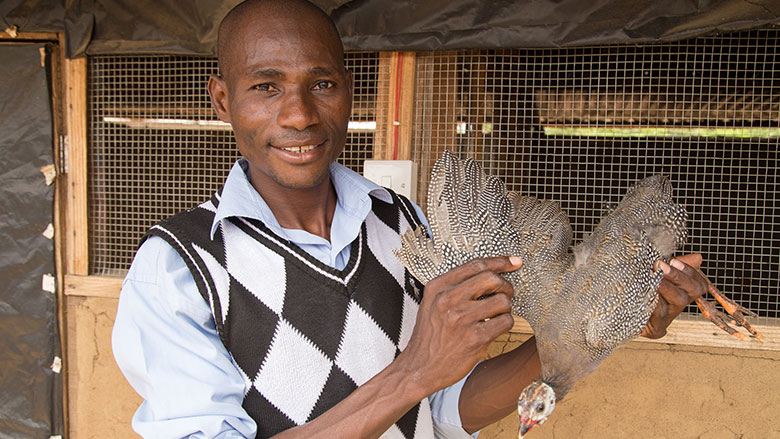
Gideon Anaba has been up since dawn, checking on soon-to-be hatched guinea keets, feeding grown guinea fowl and tending to customers who have come to buy eggs and birds. Ever since he retired from active service, the 64-year-old’s days have been fuller than ever. And it’s no wonder, because increasing demand has turned what was once a part-time pursuit into a booming business.
“In local restaurants, people prefer guinea fowl to imported poultry meat”, says Anaba, a guinea fowl farmer in Boku, Ghana. A favorite at roadside barbecue stands and upscale restaurants throughout Ghana, the nutritious and low-fat guinea fowl represents a lucrative business for smallholder farmers who want a low-maintenance livestock to raise.
The West Africa Agricultural Productivity Program (WAAPP), which works with researchers, farmers and others to build a food system to feed every African, is growing the guinea fowl industry into an engine of job creation in rural Ghana. Over the past two years, WAAPP has helped 80 guinea fowl farmers in the Northern, Upper East and Upper West regions of Ghana scale up operations. It has also revitalized production of a homegrown vaccine to combat Newcastle disease, a virus that is deadly to poultry. More than 38 million doses of the vaccine have been released to 137,400 farmers since 2013, and the vaccine is now being exported to other West African countries, including Niger and The Gambia.
Every WAAPP beneficiary receives a starter kit that includes financial support, an incubator, generator, 500 eggs, dewormer, feed and vaccines. Beneficiary farmers also receive regular visits from agricultural trainers who teach them how to care for birds so that more survive. Incubators and techniques such as housing birds to protect them from hawks have boosted the production rate of guinea fowl by more than 500%. With WAAPP assistance, farmers can now produce between 600 and 800 birds per quarter, up from less than 100 birds per year.
This can be transformational for small guinea fowl farms, where the survival rate can make or break the business.
WAAPP-Ghana's guinea fowl program is designed so that beneficiary farmers also support others in their community. Each WAAPP-sponsored farmer is paired with an aspiring guinea fowl farmer, to whom he provides guidance and access to resources. For a low fee, WAAPP beneficiaries also rent out space in their incubators to farmers who want to hatch their eggs. Entire communities of guinea fowl farmers have thrived as a result, with up to 50,000 people benefiting from WAAPP’s initial investment in just 80 farmers.
"Agriculture is already one of Ghana’s biggest employers, but the energy and optimism that fuels the sector means that it can have an even bigger impact," says Henry Kerali, Country Director, Ghana. "The Bank is supporting Ghana's guinea fowl industry because it’s ripe for expansion--it has the potential to create thousands of jobs, earn revenue by selling to the local and international market and help alleviate poverty."
Recognizing the industry’s potential, a community of dozens of farmers are eager to benefit from the experience of Adamu Mubarik, a 34-year-old guinea fowl farmer from Garu Tempane district (721 Km from Accra, the capital), "I get calls from Kongo, Basunde, every corner of this district," he says. "They want to hatch their eggs using the incubator or buy eggs or aguinea keet. They've heard of the farm and want to see what I’m practicing here." Mubarik, who received a starter kit from WAAPP in 2013 and now produces up to 3,200 birds a year, is keen to put others on the path to success. He incubates eggs for other farmers for as low as 20 pesewas or US$ 0.05 cents per egg and advises young people on how to get started as a guinea fowl farmer.
"Before WAAPP gave us technologies and techniques to protect our birds from predators and disease, I couldn't make more than 100 birds a year. Now our losses are very few—this year alone we had over 800 birds so I hired people to help me," he says. "Thanks to income from this business, I paid my children's university bills without going in for a loan." Says Adamu Mubarik.
Mubarik pays it forward because he knows what it's like to face a dearth of opportunity-a challenge shared by many ambitious, hardworking youth in Africa. He was once a university graduate who had difficulty finding a job and was forced to rely on his uncle in Accra for support. Now, he's an entrepreneur who is single-handedly sending his sister to university, providing for his family and expanding his business to create jobs and serve the needs of his district. Mubarik's success makes him a role model for young people who have the drive to make it on their own. "Guinea fowl is an industry that is lucrative for every young man to go into. This is an area you can make profit," he says. "Young men should go into guinea fowl rearing-- it can really change your lives."







